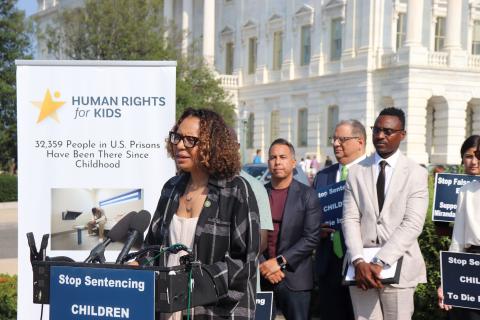Kamlager-Dove Remarks at Press Event Introducing Juvenile Justice Reform Legislation
WASHINGTON, DC – Today, Congresswoman Sydney Kamlager-Dove (CA-37) spoke at a press conference with Congressman Tony Cárdenas (CA-29), Congressman Bruce Westerman (AR-04), and juvenile justice advocates to introduce a series of juvenile justice reform bills, including the Childhood Offenders Rehabilitation and Safety Act that the Congresswoman sponsored to better address the needs of juveniles and provide holistic pathways for rehabilitation. Below is a transcript of her remarks as delivered.

Congresswoman Sydney Kamlager-Dove at press conference announcing the introduction of a series of juvenile justice reform bills.
"I'm happy to be joined by my fellow Californian Congressman Tony Cárdenas and the Chair of Natural Resources, upon which I also sit, Congressman Bruce Westerman, as we announce this package of juvenile justice reform bills.
I'm also glad, always, to be joined by the advocates that are here with us today.
You know, my origin story is criminal justice reform politics in California. It's what I know, and it's what I care most deeply about.
And our current criminal legal system is overly punitive and schizophrenic, and it focuses more on corrections than rehabilitation. It is designed for adults, and we have allowed it to consume our children. So much so, that the United States houses more young people than any other country in the world.
Young people like Michael R., who I know.
Michael is an intellectually gifted young man. His mother suffered a mental health crisis and left. His father worked long hours at multiple jobs and was never around, and he was navigating his own sexual identity and had no one to support him through that journey.
You know, we know that our young people need purpose, they need belonging, they need community.
And Michael was left out of that equation. So much so that he got caught up and ended up in the adult criminal system, where he became an obvious target for all kinds of abuses that happened to him every single day.
He was on a dangerous downward trajectory until someone finally, within the system, saw him, noticed him, and took enough time to figure out what he was good at. And it turned out that he was good at writing. And once that was tapped, he was able to shine brightly, like we want all of our young people to do.
It's about finding that thing that allows you to ignite – connect with the ignition of possibility with our young people, and that's all they need. That's all they need from us – purpose, belonging, community.
Instead, we devalue them, demean them, dismiss them, castigate them, punish them, incarcerate them, and then we demand that they recover and rehabilitate like adults, and it's illogical.
The Supreme Court, down to local jurisdictions, have already recognized the science of maturation and brain development. And 17 years, 18 years of age – those are not magic numbers, especially when it comes to maturity.
So why are we treating it so with our correctional facilities?
And in California, while I appreciate that we're doing well, we've actually had to close juvenile correction facilities because many of them are not working. They are hyper- punitive environments – we have seen – with rampant abuse, sexual assault, where children have been isolated, denied basic privileges, where counselors have turned into organizers for 'Hunger Games' for the young people in those systems, and ultimately, where juveniles have died. Where juveniles have died!
Where they have been repeatedly raped, put in isolation, hazed, and died.
15-year-olds, 14-year-olds, 13-year-olds.
So, this is very real, and this is what I know, and this is why I’ve authored this bill, and this is why we have to continue to talk about it.
No one wants to talk about young people being sexually assaulted, being trafficked, being abused, and then being asked to rehabilitate and forget all of that, like we want adults to do, and we know adults can't even get it right.
So, this is an opportunity for us to address something that is incredibly illogical, punitive, and oftentimes deadly to the young people that we are trying to support and encourage into adulthood and in our community. So, I am grateful to be here today to talk about this issue.
And thank you for being here in support of these advocates behind us who have the same stories today."
# # #